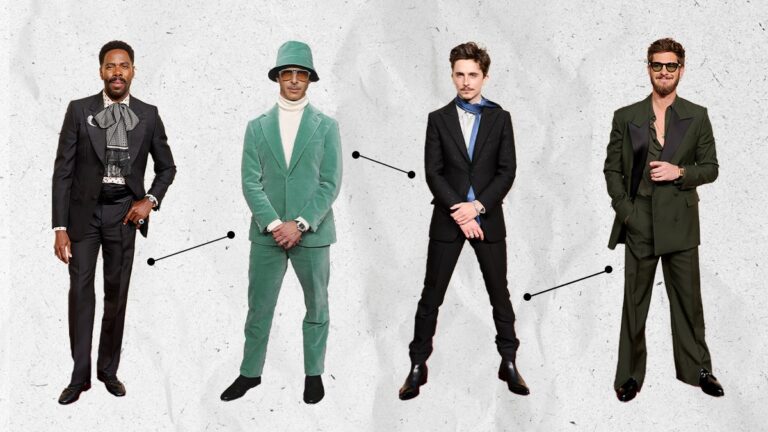Whew.
Consider, now, that Ackermann has outfitted his famous celebrity bestie, Chalamet, for the Golden Globes, giving everyone a first look at his Tom Ford. In fact, some of the buzziest looks of the evening — the official kick-off to the 2025 awards season — came from labels skipping the men’s shows.
Garfield’s viral moment was a play on a Gucci Notte look by De Sarno, who also dressed Jesse Plemons and Kirsten Dunst, while Redmayne and Domingo were outfitted by Valentino. Best Actor winner Adrien Brody wore Thom Browne — the closest thing to a trad suit, though not at all when paired with an XXL brooch. Ditto of Andrew Scott’s monochromatic Vivienne Westwood ensemble.
In fact, the only high-profile actor in attendance at the Golden Globes wearing a classic black suit was Cooper Koch of Monsters: The Lyle and Erik Menendez Story — and internet boyfriendship — fame. Koch wore Armani, though this was a somewhat subverting statement of its own as an out gay man who attended hand in hand with his partner. It’s a bit tired to write based on the assumption that queer folk always dress the most flamboyant, but that doesn’t mean it’s not a recurring stereotype ripe for deposing, particularly from an actor who has spoken out about how he was once told his voice was “too gay” to book roles.
It would be remiss to point out that this comes with a shift in culture surrounding the conversations we have around men, which have in turn impacted the way men’s fashion operates. It’s not only acceptable to publicly fawn over men today — just check any attractive man’s TikTok comments section for expressions I dare not quote in this piece — but a fully fledged marketing strategy (see Dickinson doing a “milk taste test” for A24 in promotion of Babygirl, in which he stars alongside Nicole Kidman). At a time in which luxury brands are looking to cut costs to navigate a luxury slowdown — stay tuned for more on this topic — it only makes sense for them to fold less buzzy menswear shows into more extravagant co-ed shows and lean into celebrity to allow the internet to work its magic.
As a final aside, consider this: today, everyone is a critic. Every red carpet prompts an abundance of pseudo fashion police (remember Joan Rivers?) content, from Instagram stories to floating-head TikToks or Instagram Reels. The call is, of course, coming from inside the house. I can first-hand attest to how well this kind of content performs online — and how much brands love to be mentioned, for better or for worse. People are watching, and they care too much, and so men — and the industry — are following suit. Is this the beginning of a menswear revolution for 2025?
Comments, questions or feedback? Email us at feedback@voguebusiness.com.
More from this author:
2024’s hottest fashion trend? No trend at all
How quiet luxury changed dupe culture
Where does luxury fashion fit in the gift guide Olympics?


